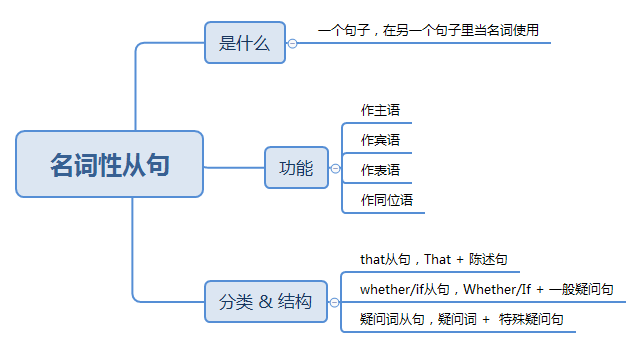名词性从句
在前面我们提到,英文中的复杂句主要分为两大类,并列句和复合句。其中,复合句主要有三种类型,名词性从句、状语从句和定语从句。今天我们来看看最简单复合句,名词性从句。
一、什么是名词性从句
所谓从句,就是一个句子,在另一个句子里做句子成分。
名词性从句,就是一个句子,在另一个句子里当名词使用。它相当于一个名词,名词能做什么,它就能做什么。
在一个句子中,名词一般是作主语、宾语、表语和同位语。相应的就会有主语从句、宾语从句、表语从句和同位语从句。比如,“他不爱读书让我很生气”。就是一个主语从句。这里的“他不爱读书”不仅是主语,而且还是一个完整的句子。
从句需要有引导词。比如,“他不爱读书让我很生气”。绝对不能翻译为“He doesn’t like to study makes me angry.”,必须加上引导词"That he doesn’t like to study makes me angry."。
名词性从句的引导词可以被划分为以下3类:
- that引导的陈述句
- whether/if引导的一般疑问句
- 疑问词引导的特殊疑问句
二、that从句
任何一个陈述句,前面加上引导词that,就构成了that从句。当that从句在句子中作宾语/表语时,that可以省略。
-
That everyone may receive a moderate education is an object of vital importance.(主语从句)
每个人能够接受适当的教育是一个至关重要的目标。
-
Many people pretend that they understand modern art.(宾语从句)
Many people pretend they understand modern art.
很多人装成很懂现代艺术的样子。
-
The most surprising thing about it, however, is that it can land anywhere: on snow, water, or even on a ploughed field.(表语从句)
The most surprising thing about it, however, is it can land anywhere: one snow, water, or even on a ploughed field.
然而,最令人惊奇的是它能够在任何地方降落:雪地、水面甚至刚耕过的田里。
-
No one could count for the fact that one of the boxes was extremely heavy.(同位语从句)
其中有只箱子特别中,可谁也弄不清是怎么回事。
that从句作主语时,为了使主干更紧凑,通常可用it作形式主语,而将真正的主语后置。
-
It was obvious that he was very embarrassed.
That he was very embarrassed was obvious.
显然他感到很尴尬。
-
It is a curious coincidence that Mr. Page will have been teaching for a total of forty years.
That Mr. Page will have been teaching for a total of forty years is a curious coincidence.
佩奇先生执教总共满40年,这真是奇妙的巧合。
需要注意的是,consider、deem、think、find和believe这五个动词是宾补动词,构成第四大句型,表示“认为…是…”。在宾补句型中,如果宾语是一个从句,则不能采用宾语补语的常见造句规则。
比如,“我认为健康是非常重要的”,这里的“健康”是一个名词,因此可以直接翻译为“I think health very important”。
而“我认为我们每天说英语是重要的”,这里的“我们每天说英语”是一个从句,此时不能翻译为“I think that we should speak English important”,而应该翻译为“I think it important that we should speak English”。
-
I think it necessary that you do it at once.
我认为你必须立刻做那件事。
-
We find it necessary that we practice spoken English every day.
我们发现每天练习英语口语很有必要。
三、whether/if从句
whether/if从句用于引导一般疑问句。所谓一般疑问句,就是答案为“是”或者“不是”的问句。比如,Will he come tomorrow?就是一个一般疑问句。
任何一个一般疑问句,前面加上引导词whether或if,就构成了whether/if从句。比如,“我不知道他明天会来吗?”这句话不能翻译为:I don’t know will he come tomorrow。正确的翻译应该是:I don’t know if he will come tomorrow.
需要注意的是,主语与be动词或助动词的位置要还原成陈述句的样子。如果助动词为do,does,did,在还原成陈述句后,需要将do,does,did去掉,后面的动词根据人称和时态进行变化。
-
Whether they would support us was a problem.(主语从句,Would they support us?)
他们是否会支持我们还是一个问题。
-
He asked if Mr Gilber’s operation had been successful and the doctor told him that it had been.(宾语从句,Is Mr Gilber’s operation successful? / Has Mr Gilber’s operation been successful?)
他问吉尔伯特先生的手术是否成功,医生告诉他手术很成功。
-
On the way home, he asked Jenny if she (had) enjoyed the speech.(宾语从句,直接宾语,Do you enjoy the speech?)
在回家的路上,他问珍妮是否喜欢他的祝词。
还一点需要注意的是,在介词后或or not结构中,通常用whether。
-
My sister is only seven, but she always tells me whether my pictures are good or not.
我的妹妹只有7岁,但她总能说出我的画是好还是坏。
-
I worry about whether I hurt his feeling.
我担心是否伤害了他的感情。
四、疑问词从句
疑问词从句的构成方法与whether从句一样,只是将whether换成疑问词(when、where、what、how和why等)而已。此外,语序的变化规则和whether从句也是相同的。比如,“我不知道他什么时候来”,应该翻译为:I don’t know when he will come.
-
He asked when Mr Gilbert would be allowed to go home and the doctor told him that he would have to stay in hospital for another two weeks.(宾语从句,)
他问吉尔伯特先生什么时候可以回家,医生说他在医院还必须再住上两个星期。
-
The doctors have not yet decided how the woman died.
医生至今还未确定这位妇女的死因。
-
I have no idea what has happened to him.
我不知道他发生了什么事?
五、小结
最后,小结一下今天的内容吧,我们还是直接看图:

六、造句练习
注:鼠标选中空白处有惊喜哦
-
谁将负责这项工程还没有(被)决定。(be in charge of)
Who will be in charge of the project hasn’t been decided yet.
-
他要来参加这个会议(已经)使得我们每个人激动了。
It makes every one of us very excited That he will come to the conference.
-
它告诉我们他们会帮助我们完成整个工作的。
He told me that they would help us finish the whole work.
-
我不知道您是否能小声点。
I wonder whether/if you would mind making less noise.
-
我认为每天多喝水是有必要的。
I think it necessary that we (should) take/drink plenty of water every day.
-
我不知道他们什么时候回来定居。
I have no idea when they will be back and settle down.
-
我(已经)发现所有的票都(已经)卖光了。
I have found that all the tickets had been sold out.
-
问题是这部电视剧是否值得一看。
The question is whether the TV play is worth watching.